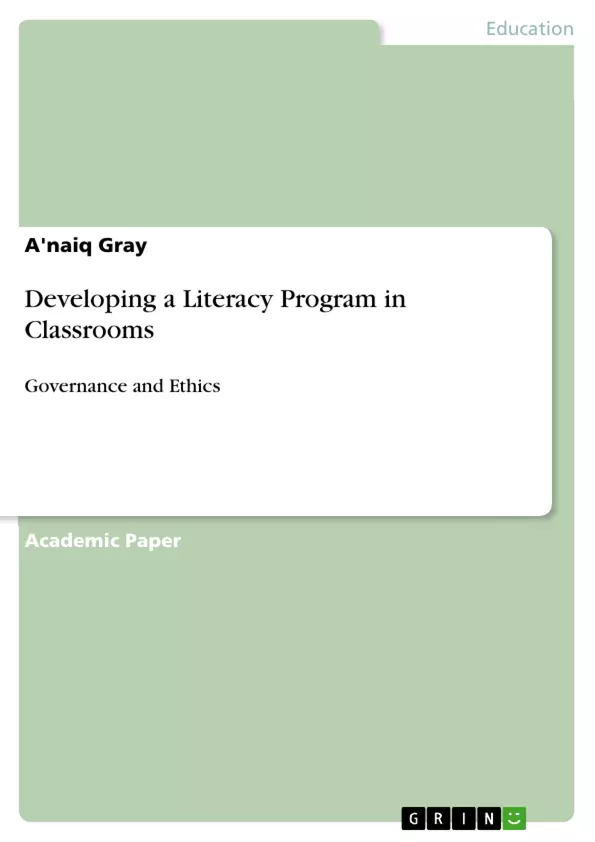When stepping into the 21st century, classroom leaders in the education system who desire to focus on ensuring that every child achieves academic success, are met with a wide range of challenges that may impede or facilitate a child's learning experience. When developing a literacy program, leaders should focus on reaching every child through differentiated instructional techniques that encourage engaging and literacy rich classroom environments. Additionally, when developing a welcoming learning environment a few key areas that should be understood and properly implemented are the laws, regulations, and ethical implications that will impact learning experiences. The following information will explain and analyze the importance of leadership roles, and how to make decisions that will build a successful literacy program.
Inhaltsverzeichnis (Table of Contents)
- Ethical Literacy Leadership
- Policy History and Data-Driven Decisions
Zielsetzung und Themenschwerpunkte (Objectives and Key Themes)
This document examines the crucial aspects of developing successful literacy programs in the 21st-century classroom. It emphasizes the importance of ethical leadership, data-driven decision making, and the role of policies in promoting early literacy development.
- The importance of ethical leadership in literacy program development
- The role of policies and historical context in shaping literacy initiatives
- The need for data-driven decision-making in literacy program implementation
- The significance of fostering a collaborative vision among stakeholders
- The critical role of teacher education in promoting early literacy
Zusammenfassung der Kapitel (Chapter Summaries)
- Ethical Literacy Leadership: This chapter focuses on the ethical considerations involved in developing literacy programs. It examines the NPBEA's leadership standards, highlighting the importance of creating a supportive learning environment for students and promoting professional growth for teachers. The chapter stresses the responsibility of leaders to advocate for equity, diversity, and high academic expectations for all students.
- Policy History and Data-Driven Decisions: This chapter delves into the historical evolution of early literacy policy and its impact on current educational practices. It discusses the significance of early intervention to prevent reading problems and highlights the role of partnerships between organizations like the International Reading Association and the National Association for Education of Young Children in advocating for early literacy programs. The chapter emphasizes the need for rigorous professional development to ensure teachers are equipped with the skills and knowledge to effectively promote early literacy.
Schlüsselwörter (Keywords)
This document focuses on key terms and concepts related to literacy program development, ethical leadership, data-driven decision-making, early literacy intervention, policy history, and teacher education.
What are the key challenges in 21st-century literacy education?
Leaders must navigate diverse student needs, ensuring academic success through differentiated instruction and engaging, literacy-rich environments.
What is Ethical Literacy Leadership?
It involves creating supportive environments, advocating for equity and diversity, and maintaining high academic expectations based on NPBEA leadership standards.
How do data-driven decisions impact literacy programs?
Data allows educators to make informed choices about program implementation, track student progress, and adjust strategies to prevent reading problems.
What role do laws and regulations play in classroom literacy?
Understanding policy history and legal frameworks is essential for building a welcoming environment and ensuring compliance with educational standards.
Why is teacher education critical for early literacy?
Rigorous professional development ensures teachers have the skills and knowledge to effectively promote literacy and support diverse learners.
What is the significance of collaborative vision among stakeholders?
Building a successful literacy program requires partnerships between organizations, administrators, and teachers to advocate for early intervention.



